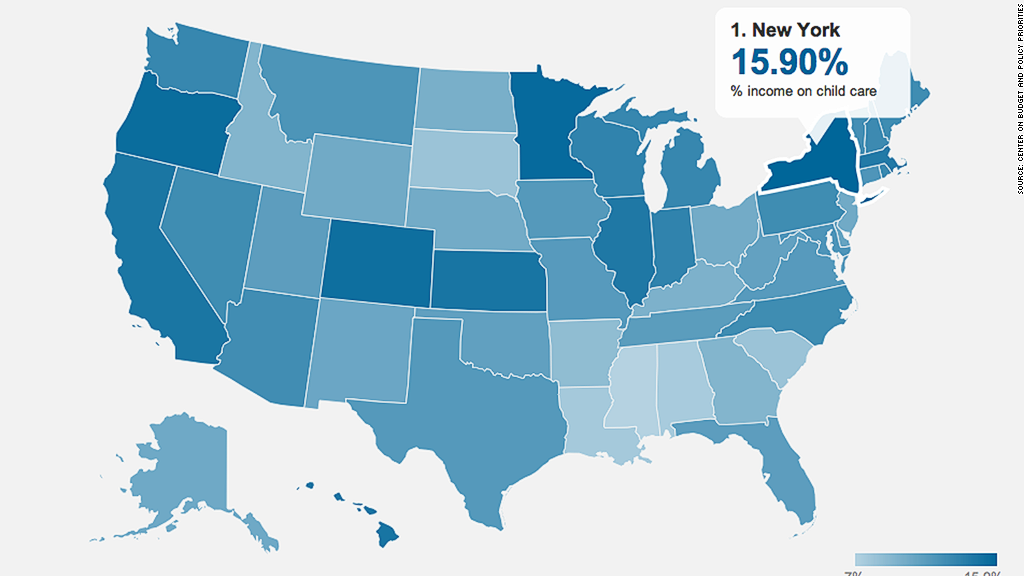While the experience of raising a child may be priceless, the cost to provide care for them is getting to be more than most parents can afford.
According to a report from Child Care Aware of America Thursday, the annual cost of infant care increased roughly 2% last year and ranged from about $4,600 in Mississippi to $15,000 in Massachusetts. Meanwhile, the cost of providing care for a four-year-old increased by more than 4% and ranged between $3,900 a year in Mississippi to almost $11,700 a year in Massachusetts.
For most parents, child care is by far their largest household expense. And the growing costs have put a tremendous strain on their budgets.
In almost half of all states, the cost of center-based care for one child exceeded annual median rent payments, the report said. And when two children are factored in, the costs exceeded rent payments in all 50 states. Child Care Aware also found that in 35 states, the cost to provide center-based care for an infant was higher than in-state tuition and fees for one year at a four-year public college.
Related: Raising a child just got $8,000 more expensive
The uptick comes at a time when cash-strapped parents have seen most major expenses associated with raising a child increase. Food prices have been creeping up throughout the country, with the United Nations index of cereal prices soaring 17% in the last month alone. Gas prices are also on the rise, steadily climbing back toward this year's high of nearly $4 a gallon.
A report out earlier this summer found that, as a result of these increased costs, it will cost parents $8,000 more to raise a child born in 2011 to the age of 17. All of that is piled on top of worries about a slowing economy and continued concerns over the job market.
"Child care costs have become a bigger burden for parents since the economy turned," said Ollie Smith, interim executive director of Child Care Aware, a child care advocacy organization. "When you talk about the cost being $15,000 a year, people just cannot afford to pay that now."
But with nearly 11 million children under age 5 in child care, many families are forced to figure out a way.
"Parents have to make some very difficult decisions: Do you pay your child care or do you pay your rent?" said Marsha Basloe, executive director of New York's Early Care & Learning Council. "In this economy, when they're really just trying to make ends meet, families are moving to informal childcare."
As a result, more parents are turning to unlicensed child care centers that aren't required to meet health and safety or training standards, she said.
"Quality of care really makes a huge impact on the child's readiness for school, which impacts his or her success throughout school and later in life, but many parents are stepping away from it because of the cost," said Basloe.
Related: Artists find a perfect business in child care
While families across the country are feeling the burden, Child Care Aware's report says not all states are created equal when it comes to child care costs. The report, which compiled data from child care centers around the country, determined which states were least affordable by factoring the average cost of care with the median income for the state. New York tops the least affordable list for full-time infant care, and Minnesota, Oregon, Colorado and Illinois round out the top five.
Basloe said that New York leads the pack not only because the cost of living is higher, but also because there are many regulations that child care facilities have to comply with that add to the price.
"We have very high regulations and standards, from the ratio of teachers to students, to training and education standards, and that leads to a greater cost," she said.
"We want those regulations. We want our children to be safe. But we also want parents to be able to afford quality care."
10 least affordable states for child care
State | Cost of care as a % of income for a single-mother family | Cost of care as a % income for a two-parent family |
|---|---|---|
New York | 44.8% | 13.1% |
Minnesota | 40.1% | 12% |
Wisconsin | 40.7% | 12% |
Oregon | 38.4% | 11.8% |
Vermont | 34.6% | 11.4% |
Colorodo | 35% | 11.1% |
Kansas | 35.4% | 11.1% |
Massachusetts | 41.8% | 11.1% |
Indiana | 36% | 10.9% |

